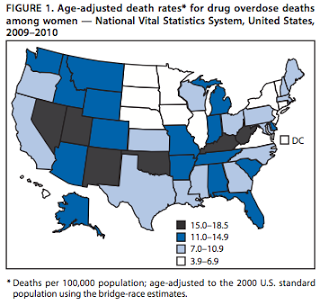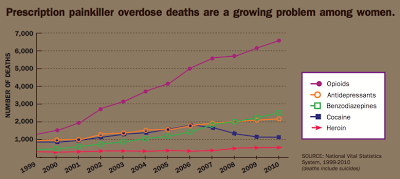Health News
 The ongoing national epidemic of addiction to prescription painkillers is spreading more quickly among women, and it is killing more women than ever before. Kentucky ties Utah for the fifth highest percentage of female deaths due to prescription-drug overdose (15.7 percent), says a new government report.
The ongoing national epidemic of addiction to prescription painkillers is spreading more quickly among women, and it is killing more women than ever before. Kentucky ties Utah for the fifth highest percentage of female deaths due to prescription-drug overdose (15.7 percent), says a new government report.
Opioids, or prescription painkillers, are the leading cause of drug-overdose deaths among women, accounting for 70 percent of overdoses. And, although men are more likely than women to die from drug overdose and Kentucky has the highest rate of male deaths in the country (25.9 percent), the percentage increase in the rate of overdose deaths from 1999 to 2010 was greater for women (151 percent) than for men (85 percent). During that period, there was a 415 percent overall increase in opioid painkiller-related deaths among women, compared with a 265 percent increase among men, says a Centers for Disease Control Vital Signs report released last week. (CDC graphics)

Since 2007, more women have died from drug overdoses than from motor-vehicle traffic injuries and about five times as many women died from prescription-painkiller overdoses in 2010 as in 1999. About 6,600 of those deaths occurred in 2010 alone, and prescription painkillers are reported to be involved in one of every 10 suicides among women, says the report.
Across the nation, about 18 women per day die from prescription drug overdose and every three minutes, a women goes to an emergency room for prescription-painkiller misuse or abuse, which is more likely to occur in women between the ages of 25 and 54. The report also says the rise of deaths from prescription drugs relates closely to increased prescribing of these drugs during the past decade.
States can take action against the dangers of prescription drug abuse by increasing access to substance abuse treatment while reducing barriers to getting such treatment, says the report. It is also important to educate health care providers about effective pain treatment options and to educate the public about the risks and benefits of taking prescription painkillers. Click here for a PDF factsheet from the CDC.
- Cdc Report Finds Heroin Use Increased By 63 Percent Since 2002, With Greatest Increases Seen Among Women And Whites
Heroin use increased 63 percent and heroin-related overdose deaths nearly quadrupled since 2002, according to a report from the federal Centers for Disease Control and Prevention. As heroin use has increased, so have heroin-related overdose deaths....
- Deaths From Drug Overdoses And Prescriptions For Opiate Treatment Drugs Are Both Rising, Worrying State Officials
Despite measures to discourage prescription drug abuse, Kentucky health officials report overdose deaths continue to rise and opioid treatment drugs are being prescribed "at alarming rates," Kevin Wheatley reports for cn|2's "Pure Politics." A shift...
- Kentucky Ranks No. 4 In Painkiller Prescriptions; Neighboring States Are First, Second And Third
Powerful painkillers are a contributing factor in the the rising rate of overdose deaths in the U.S., especially in Kentucky, where officials have recommended more measures be taken to monitor painkiller prescriptions. Now the government is pointing out...
- Deaths By Overdose, Mainly Of Prescription Drugs, Hit A New Record In U.s. In 2011; A Huge Problem In Kentucky
Drug overdose deaths in the U.S. rose for the 11th straight year and accidental deaths involving addictive prescription drugs overshadow deaths from illicit narcotics, new federal data show. In 2010, there were 38,329 drug overdose deaths nationwide,...
- Deaths From Drug Overdoses In Kentucky Hit New High In 2010; More Than Half Involved Prescription Drugs
Deaths from drug overdoses in Kentucky jumped to a new high in 2010, and "rose a staggering 296 percent from 2000 to 2010," Bill Estep of the Lexington Herald-Leader reports. "A tidal wave of prescription-drug abuse drove the steep increase," with...
Health News
Prescription drugs killing more women than ever; Kentucky ties for fifth for its high percentage of deaths

Opioids, or prescription painkillers, are the leading cause of drug-overdose deaths among women, accounting for 70 percent of overdoses. And, although men are more likely than women to die from drug overdose and Kentucky has the highest rate of male deaths in the country (25.9 percent), the percentage increase in the rate of overdose deaths from 1999 to 2010 was greater for women (151 percent) than for men (85 percent). During that period, there was a 415 percent overall increase in opioid painkiller-related deaths among women, compared with a 265 percent increase among men, says a Centers for Disease Control Vital Signs report released last week. (CDC graphics)

Since 2007, more women have died from drug overdoses than from motor-vehicle traffic injuries and about five times as many women died from prescription-painkiller overdoses in 2010 as in 1999. About 6,600 of those deaths occurred in 2010 alone, and prescription painkillers are reported to be involved in one of every 10 suicides among women, says the report.
Across the nation, about 18 women per day die from prescription drug overdose and every three minutes, a women goes to an emergency room for prescription-painkiller misuse or abuse, which is more likely to occur in women between the ages of 25 and 54. The report also says the rise of deaths from prescription drugs relates closely to increased prescribing of these drugs during the past decade.
States can take action against the dangers of prescription drug abuse by increasing access to substance abuse treatment while reducing barriers to getting such treatment, says the report. It is also important to educate health care providers about effective pain treatment options and to educate the public about the risks and benefits of taking prescription painkillers. Click here for a PDF factsheet from the CDC.
- Cdc Report Finds Heroin Use Increased By 63 Percent Since 2002, With Greatest Increases Seen Among Women And Whites
Heroin use increased 63 percent and heroin-related overdose deaths nearly quadrupled since 2002, according to a report from the federal Centers for Disease Control and Prevention. As heroin use has increased, so have heroin-related overdose deaths....
- Deaths From Drug Overdoses And Prescriptions For Opiate Treatment Drugs Are Both Rising, Worrying State Officials
Despite measures to discourage prescription drug abuse, Kentucky health officials report overdose deaths continue to rise and opioid treatment drugs are being prescribed "at alarming rates," Kevin Wheatley reports for cn|2's "Pure Politics." A shift...
- Kentucky Ranks No. 4 In Painkiller Prescriptions; Neighboring States Are First, Second And Third
Powerful painkillers are a contributing factor in the the rising rate of overdose deaths in the U.S., especially in Kentucky, where officials have recommended more measures be taken to monitor painkiller prescriptions. Now the government is pointing out...
- Deaths By Overdose, Mainly Of Prescription Drugs, Hit A New Record In U.s. In 2011; A Huge Problem In Kentucky
Drug overdose deaths in the U.S. rose for the 11th straight year and accidental deaths involving addictive prescription drugs overshadow deaths from illicit narcotics, new federal data show. In 2010, there were 38,329 drug overdose deaths nationwide,...
- Deaths From Drug Overdoses In Kentucky Hit New High In 2010; More Than Half Involved Prescription Drugs
Deaths from drug overdoses in Kentucky jumped to a new high in 2010, and "rose a staggering 296 percent from 2000 to 2010," Bill Estep of the Lexington Herald-Leader reports. "A tidal wave of prescription-drug abuse drove the steep increase," with...
